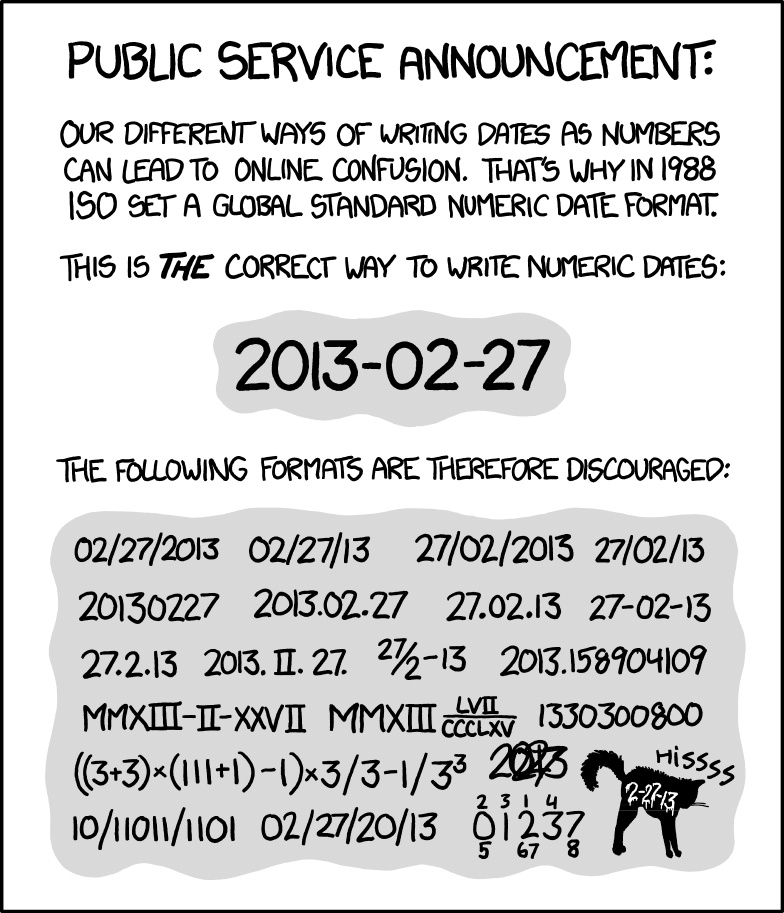
Can’t believe he missed the opportunity to add 41332 to the number of ways of how not to write dates.
They’re trying to make it look fake!
I must be missing something.
Experience with excel.
I feel better that I don’t understand now.
I recall writing a script that produces that 01237 with smaller digits around it for the current date. It lists the numbers that occur in the date (0, 2, 3 and 9 for 2023-09-09), the smaller digits show at which position they show up in a YYYYMMDD format (the 0 shows up on positions 2, 5 and 7)
The script has not been pushed online cause it was so dang bad
It warms my heart to see so many comments in the camp of “I use it everywhere”. Absolutely same here. You are my people.
Together with hh:mm(:ss) for times and +hh:mm for timezones. Don’t make me deal with that 12am/pm bullshit that doesn’t make any sense, and don’t make make me look up just what the time difference is between CEST and IST. Just give me the offsets +02:00 and +05:30, and I can calculate that my local time of 06:55+03:30=10:25 in India.
To the commenters justifying the written form MM-DD-YYYY on the basis of preferring to say the name of the month followed by the day (which the written numerical sequence does not preclude you from doing). If someone were to say something like “the time is a quarter to eleven” do you think they would have a case for writing it 45:10? And if so, how would you deal with the ambiguity of “ten past ten” if they wrote it 10:10 instead of 10:10?
I’m definitely in the “for almost everything” camp. It’s less ambiguous especially when you consider the DD/MM vs MM/DD nonsense between US dates vs elsewhere. Pretty much the only time I don’t use ISO-8601 is when I’m using non-numeric month names like when saying a date out loud.
Christ, do this many people really find iso8601 hard to read? It’s the date and the time with a T in the middle.
I think it’s fair that programmatic and human readable can be different. If someone is putting in the month word for a logging system they can fuck right off though
Not “many people.” Americans. Americans find it hard to read. I’m not 100% sure but I’m fairly certain everyone else in the world agrees that either day/month/year or year/month/day is the best way to clearly indicate a date. You know, because big to small. America believes month/day/year for some stupid fucking reason.
Day/month/year is not in the same category as y/m/d. That crap is so ambiguous. Is today August 9th? Or September 8th? Y/m/d to the rescue.
I’m pretty sure it’s because of the way we say it. Like, “May 6th, 2023”. So we write it 5/6/2023.
That said, I think it’s fucking stupid.
I’m not an American and English isn’t my first language, so the US way to write dates always confused me. Now, I finally understand it! Many thanks, this is legitimately sooooo useful!
There are two ways of writting dates: the “yyyy-mm-dd” one and the wrong one
ISO 8601 ftw. Here’s the date, time, and duration for our next meeting:
2023-08-10T20:00:00PT2H30M
nearly forgot that 8601 has support for durations as well
It handles ambiguity too. Want to say something lasts for a period of 1 month without needing to bother checking how many days are in the current and next month?
P1M. Done. Want to be more explicit and say 30 days?P30D. Want to say it in hours? Add theTseparator:PT720H.I used this kind of notation all the time when exporting logged historical data from SCADA systems into a file whose name I wanted to quickly communicate the start of a log and how long it ran:
20230701T0000-07--P30D..v101_pressure.csv(“
--” is the ISO-8601 (2004) recommended substitute for “/” in file names)If anyone is interested, I made this Bash script to give me
uptimebut expressed as an ISO 8601 time period.$ bkuptime P2DT4H22M4S/2023-08-15T02:01:00+0000, 2 users, load average: 1.71, 0.87, 0.68
deleted by creator
ISO-8601 over all other formats. 2023-08-09T21:11:00Z
Simple, sortable, intuitive.
Awful to actually read, though. Using T as a delimiter is mental… At least the hyphen provides some white space
Honestly, even a lowercase t.
Why are you splitting and delimiting a date object? Convert it to a shallower object if that’s what you need
While you are definitely right, I and many others use yyyy-mm-dd outside of software. And that’s when the T becomes super lame.
Using T as a delimiter is mental
You get used to it.
Good luck using colons in a filename.
Linux has been able to handle that since the 90s.
Tough luck if you are using NTFS file system. All my homies use EXT4.
btrfs/zfs > ext4
better than the absolutely deranged MM/DD/YYYY and imo the best when it comes to international communication
I’ve been told " You don’t say 6th June, do you?" too many times
The amusing thing is that in Swedish you definitely do. Or actually “6:e juni”.
Germany too
How the fuck does second largest to smallest to largest make any kind of sense?
Year-Month-Day best everywhere
Facts. The sorting system for files inevitably makes YYYY-MM-DD more optimal. I tried to resist but it doesn’t work.
ISO dates are the goat because they string compare correctly. Just yesterday I shaved 2 full seconds off a page transition by removing a date parse in the middle of a hot sorting loop. Everything should use ISO in my opinion.
Maybe we should form some sort of organization, on an international stage, dedicated to creating and maintaining such standards.
deleted by creator
I use it everywhere too. Screw the naysayers
I really wonder how americans were able to fuck this one up. There are three ways to arrange these and two of them are acceptable!
Edit: Yes, I meant common ways, not combinatorically possible ways.
Hmmm more like 6 ways but I get your point
Three ways that people actually use. YYYY-MM-DD, DD-MM-YYYY, and MM-DD-YYYY (ew).
AFAIK no-one does YYYY-DD-MM, DD-YYYY-MM, or MM-YYYY-DD… yet. Don’t let the Americans know about these formats, they might just start using them out of spite.
Need more julian dates, YYYY-JJJ.
What, 2023-223 for the 223rd day of the year 2023? That… is oddly appealing for telling the actual progress of the year or grouping. No silly “does this group have 31, 30, 29 or 28 members”, particularly the “is this year a multiple of four, but not of 100, unless it’s also a multiple of 400?” bit with leap days.
You’ll have oddities still, no matter which way you slice it, because our orbit is mathematically imperfect, but it’s a start.
So we need to correct our orbit is what I’m hearing!
That’d be a wack premise for a crazy scientist story
Twelve ways if you count two-digit years. My nephew was born on 12/12/12 which was convenient.
for the americans, that’s 12/12/12
Do people outside of the US not say dates like “June first” etc? M/D/Y matches that. It’s really not weird at all, even if the international ambiguity is awful.
Yes it is objectively weird.
When you write down “07/01/1967” are you unaware that it is unclear whether you’re referring to July 1st or January 7th?
And despite the fact that you’re writing something down for the express purpose of communicating information, and you’re choosing to shorten it’s written format to save time and space, you’re ok with either
a) just leaving it ambiguous and communicating poorly
or
b) having to write extra words to give it context, taking up more space than just writing out “July 1st, 1967”?
1967/06/01 clearly communicates we’re starting with the year and going biggest to smallest time increments. There is no ambiguity as to which order it’s ever in, and it’s far shorter than the full written date.
At a fundamental user experience level, it is objectively nonsensical to choose the American date format when your goals are 1) clearly communicating a date and 2) doing it shorter than writing out the words.
It’s not unclear to americans. “Objectively” is hilarious here. If it’s in the format people expect, then it’s perfectly fine in context. Sorry that US traditions don’t suit your fancy.
It’s definitely confusing in an international context, but well-estsblished conventions don’t change easily.
It’s not unclear to americans. “Objectively” is hilarious here. If it’s in the format people expect, then it’s perfectly fine in context. Sorry that US traditions don’t suit your fancy.
Yes, if you chose the objectively wrong way of doing something and then tell everyone that you’re always going to do it the wrong way, then yes, people will expect you to do it the dumb way. Congratulations. That’s how choosing a protocol works. That doesn’t mean that some protocols aren’t objectively worse than others.
It’s hilarious that you think “objective” is hilarious, given that you’re reasoning is based 100% on the subjective experiences of Americans.
That’s how formats work, I hate to break it to you. The ambiguity sucks, but the format itself makes perfect sense given the way americans say dates.
The ambiguity sucks, but the format itself makes perfect sense given the way americans say dates.
We all say dates the same.
It’s objectively dumb because it’s the format that results in ambiguity. Again, the point that it’s good cause Americans are familiar with it is a subjective criteria, since it only applies to American’s experience with using it, whereas the ambiguity of an out of order time span is an objective one.
Only the combination of formats results in ambiguity. Neither format is ambiguous on its own.
Standardization is good, and if someone were to change it should probably be the US given the apparent worldwide consensus otherwise. That doesn’t make either format good or bad on its own.
What I take issue with is people acting like the US format is some kind of bizarro nonsense when it in fact makes perfect sense in terms of matching spoken dates. That is hardly a weird basis for a format.
Each has its tradeoffs, and which set of tradeoffs is better is a subjective matter. I agree that d/m/y makes the most sense for an international standard (if not y/m/d), but to claim that the US format itself is somehow objectively bad is silly.
yyyy-mm-dd makes it much clearer about what fucking order things are in

















